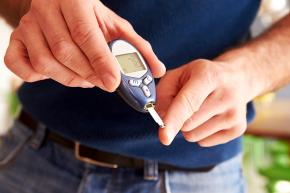Feinstein Institute Gets $1M from Knapp Family Foundation for Bioelectronic Medicine Diabetes Research
|
|

The Feinstein Institute received a $1 million
gift from The Knapp Family Foundation to
launch a research program to help diabetes
patients’ glucose metabolism without the
use of insulin.
|
07/10/2017
MANHASSET, NY — To help advance its research to treat diabetes, a disease that currently afflicts 29 million Americans, or just under 10 percent of the population, Northwell Health’s Feinstein Institute for Medical Research received a $1 million gift from The Knapp Family Foundation to launch a four-year research program that uses bioelectronic medicine to treat the disease.
“Diabetes impacts our family as it impacts millions of other families around the world, which is why we are passionate in our support of the Feinstein Institute’s innovative and scientific efforts in combating this debilitating condition,” said Charles Knapp, president of The Knapp Family Foundation.
The Knapp Family Foundation has supported life-changing initiatives at the Feinstein Institute and Northwell Health’s Lenox Hill Hospital since 2012. One year later, the Foundation began supporting novel research investigations for disease treatments that otherwise would not be funded – including type 1 diabetes.
Diabetes is a chronic disease characterized by abnormal blood glucose levels, which in turn must be regulated by drugs or insulin, treatments that may have long-term side effects and are not always reliable. Instead, a team led by Chad Bouton, vice president of Advanced Engineering for Northwell Health, director of the Feinstein Institute’s Center for Bioelectronic Medicine, and professor at Hofstra Northwell School of Medicine, will use the new support to develop an implantable device that will function as an electronic pancreas, regulating diabetes patients’ glucose metabolism without the use of insulin. Cutting-edge electronics technology will be employed to analyze and modulate specific neural pathways involved in regulating the body’s blood glucose levels.
“Current diabetes treatments are expensive and may cause patients to suffer from adverse side effects after chronic use,” said Mr. Bouton. “The new research program will support our development of devices that help the body heal itself, without relying on drugs, but rather on our own nervous system to provide new, safe treatment options for a condition plaguing so many Americans.”
The Feinstein Institute will conduct preclinical studies that will target both type 1 and type 2 diabetes during development of the new technology. Neural decoding and data analytics methods will be used to deepen the understanding of the nervous system’s role in glucose regulation.
# # #
About the Feinstein Institute The Feinstein Institute for Medical Research is the research arm of Northwell Health, the largest healthcare provider in New York. Home to 50 research laboratories and to clinical research throughout dozens of hospitals and outpatient facilities, the Feinstein includes 4,000 researchers and staff who are making breakthroughs in molecular medicine, genetics, oncology, brain research, mental health, autoimmunity, and bioelectronic medicine – a new field of science that has the potential to revolutionize medicine. For more information about how we empower imagination and pioneer discovery, visit FeinsteinInstitute.org
Contacts:
Heather E. Ball
516-465-7917
hball@northwell.edu
Julie Robinson-Tingue
516-321-6244
JRobinson5@northwell.edu